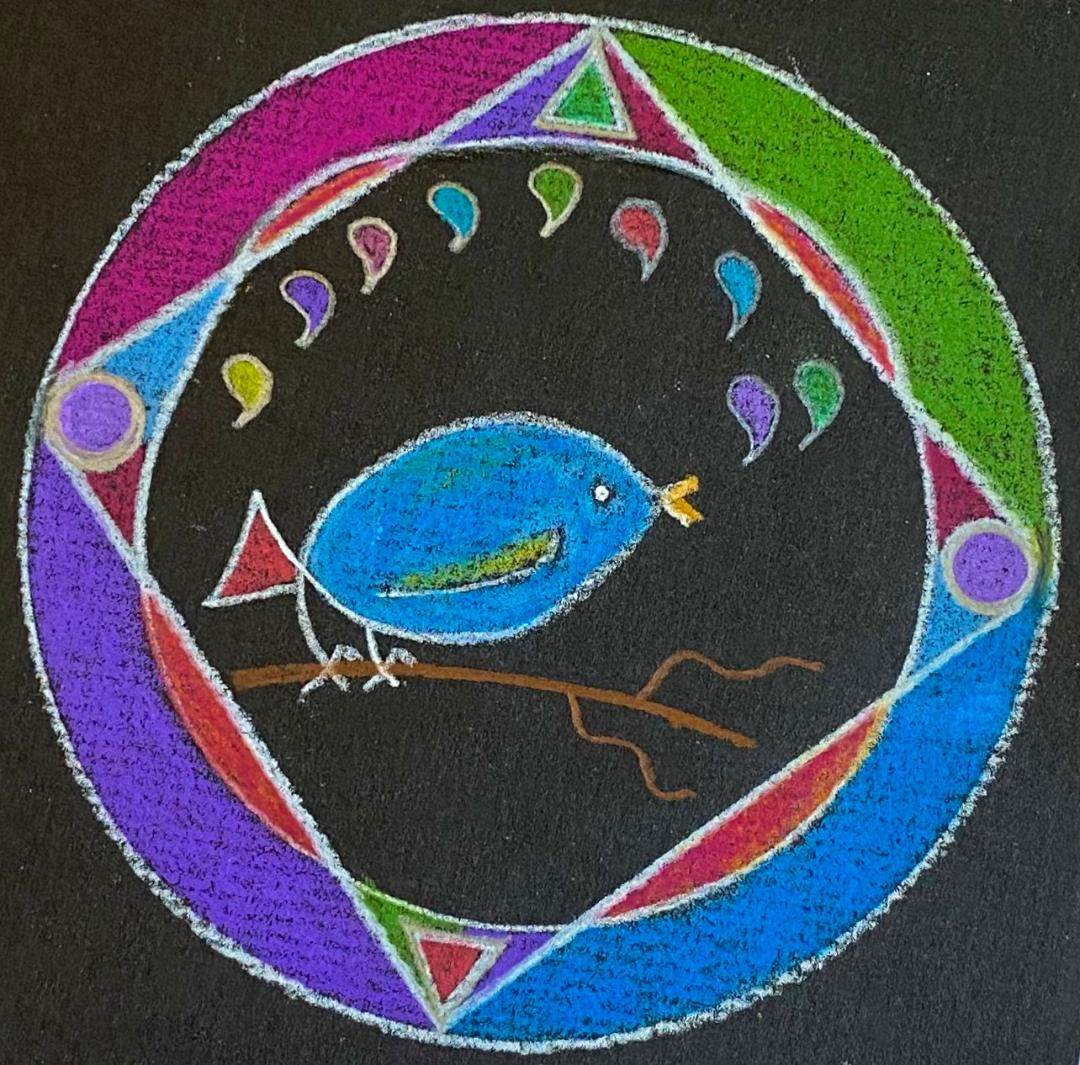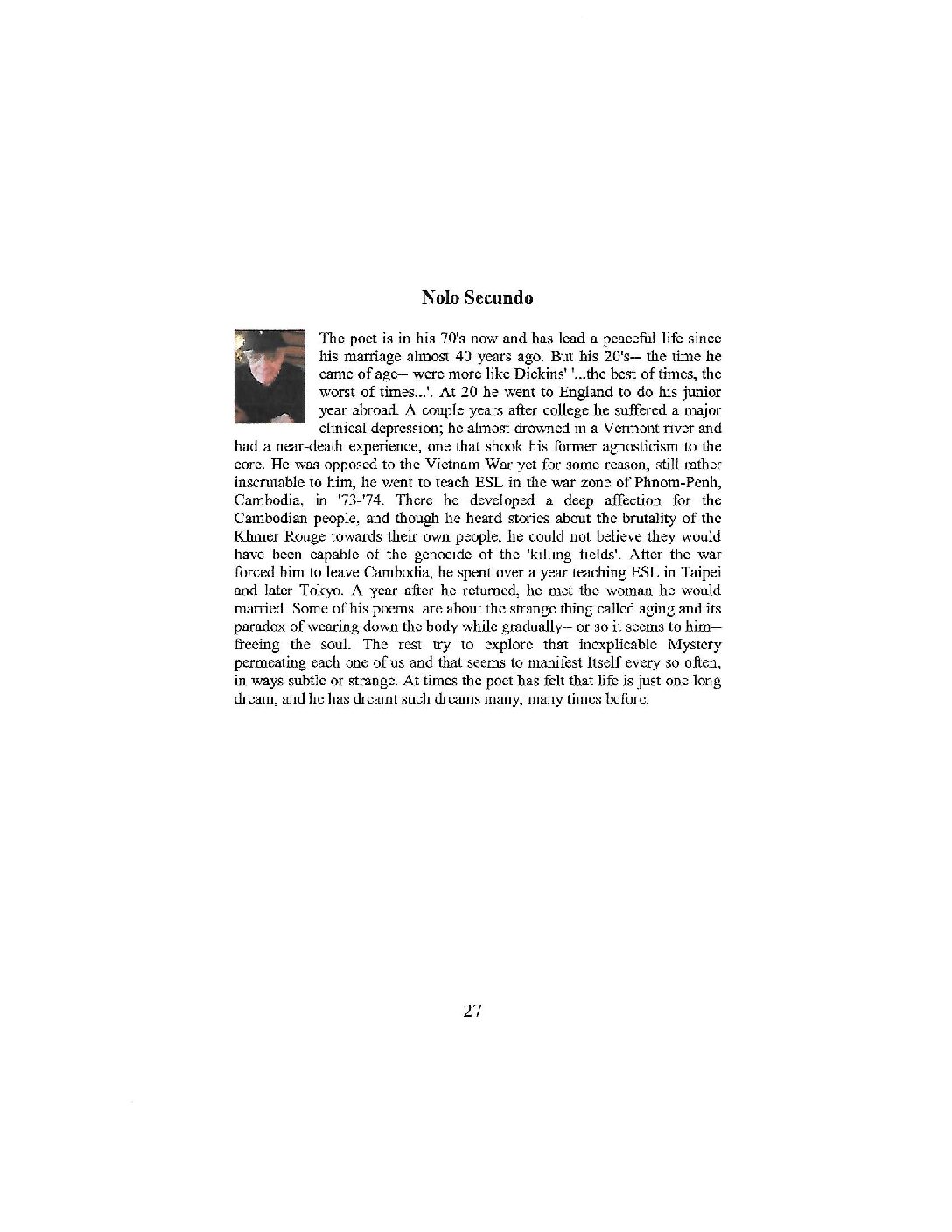1] The Knife and the Retreat One awaits the knife, not that that Is all that dramatic, cathartic, or just. But anticipation can miss surprise in the dust And there it pops up, wagging its hat. And that’s the great crisis right then, of course, That jolt of suddenly being unprepared To cope with emotion one had never cared To consider might land with unexpected force. “I’d rather be a Stoic,” old Wordsworth might say, His teeth clamping down on his old corncob pipe, “Than be clotheslined to whimper and to gripe While my sweet fantasies evaporate away.” Now retreat and recover, live, do not die. Be that imagined hermit, lonely by the Wye. 2] The Cliffside Stroll Her sonnets struggled along the cliffside path, Shells and flowers tracking her aimless way, As a dark spirit followed in shadows of the day, And blue jays whispered, choking back their wrath. But the bright sun vanquished in the blue sky, And earthquakes held themselves in control As she nibbled wafers and prayed for his soul A little, and watched the hungry seagulls fly. Below her, breakers gnashed at the rock, And old prayers ascended upward as mere mist, And memory quietly reft how they’d been One sweet time, never to come again, Since they’d looked at each other and kissed. But now the jays can resume their clamor And earthquakes swing their devastating hammer. 3] Barks So there is madness in exaggeration And some cold, bold sanity, too. Get unexcited by unthinking silence Till the dogs start barking madly at you. They know, these dogs, what’s in your mind. They hear everything, and they’re not blind. They smell all the aromas of violence And long for the bite of imagination. It is the bark of time that philosophy Avoids waking us with to keep us free From madness and unleashed disorientation, One kind of wisdom, our mortal enemy. 4] Last Conversation Do we mix admiration and regret For prudence managed half-heroically? For half-blind pleasure felt half-painfully? Ha ha, no paradise has come here yet, Nor has a fatal drama played for us With gestures, shouts, soliloquies, Devastating recognitions—no, none of these Has come, no, no bother, no fuss. One turns away, right, when warning lights Blink in the guts, and one’s breathtaking act Of false control works to distract Destructive impulse as it wildly fights. And, O you craven philosophic Judas, You let the grinning Fates come burn and loot us. 5] The Quicksa-a-a-and of Laughter One cannot keep writing sonnets. Tennessee Williams The double-Debbie’s dud dude did What he could and whenever he could And sped sometimes up to no damn good, And they all laughed hard wherever they hid, Laughing like lobsters with haha like crows, In musical moonlight uttering chuckles and snorts And torrents of turbulent hilarious sports In musical starlight until the sun rose. “The operation of masks,” he nervously spoke, “Is best done by women, whose all-wily wits Confound men’s arguments and logical fits Like music the mad game of mirror and smoke. Get away, Cassandra!” he shrieked in agony. “All right, brother—have you no faith in me?”
R. W. Haynes, Professor of English at Texas A&M International University, has published poetry in many journals in the United States and in other countries. As an academic scholar, he specializes in British Renaissance literature, and he has also taught extensively in such areas as medieval thought, Southern literature, classical poetry, and writing. Since 1992, he has offered regular graduate and undergraduate courses in Shakespeare, as well as seminars in Ibsen, Chaucer, Spenser, rhetoric, and other topics. In 2004, Haynes met Texas playwright/screenwriter Horton Foote and has since become a leading scholar of that author’s remarkable oeuvre, publishing a book on Foote’s plays in 2010 and editing a collection of essays on his works in 2016. Haynes also writes plays and fiction. In 2016, he received the SCMLA Poetry Award ($500) at the South Central Modern Language Association Conference In 2019, two collections of his poetry were published, Laredo Light (Cyberwit) and Let the Whales Escape (Finishing Line Press). His Latest collected works are Heidegger Looks at the Moon (Finishing Line Press 2022 ) The Deadly Shadow of the Wall (finishing Line Press 2023)








